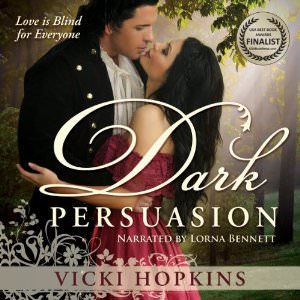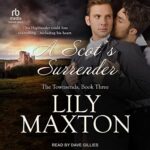While Dark Persuasion has an interesting premise and the potential to explore some of the darker emotions – guilt, jealousy, obsession – the book never overcomes a number of failures in its execution. It’s not a very “romantic” romance, and there is practically no chemistry between the leads. The characterisation of the hero lacks depth, and I found the heroine difficult to like, largely due to her treatment of the hero.
Charlotte Grey was blinded at the age of eight as the result of an unthinking, cruel act by a boy four years her senior. Ten years later, she meets two brothers at her come-out ball, Patrick and Rupert Rochester, who are as different from each other as chalk from cheese. Patrick is a quiet and rather serious young man, while Rupert is a cruel, conscienceless rake who wants nothing more than to irritate and best his brother in whatever he does.
So when Rupert sees Patrick taking an interest in Charlotte, he determines to seduce her. Never having been the subject of male attention before, Charlotte is easily taken in by Rupert’s gregarious and flirtatious manner, and instantly prefers him to his brother. In spite of her sister’s urge to be cautious, Charlotte is in the grip of her first infatuation, and dismisses Patrick as dull and humourless.
When Rupert shows his true colours, it’s left to Patrick to pick up the pieces. He loves Charlotte and wants to marry her so he can take care of her, but he shrinks from telling her the truth about the cause of her blindness. Instead, he confesses to her father, who afterwards gives Patrick his permission to ask Charlotte for her hand. She accepts his proposal, telling him bluntly that she does not love him and that she is only giving him her assent because she knows she is unlikely to receive another such offer.
I had a hard time determining just what Patrick saw in Charlotte other than her pretty face, and the fact of his desire to atone for his childhood brutality. One minute, he is seeing her for the first time in ten years, and the next, he is desperately in love with her, and there is no sense of an evolution of feeling. Patrick is very underwritten; we see him as a boy and then as a young man, but there is no real explanation as to how or why he changed from that irresponsible boy to the honourable man he is now.
I also didn’t care much for Charlotte as a heroine. While she certainly deserves admiration for the way she overcomes many of the difficulties facing her as a blind person, there are other aspects of her personality that make her a less than sympathetic character, not least of which is her poor treatment of Patrick. She never lets him forget he is not her first choice, and, because she never really talks to him about the help she will need to help her to acclimatise herself to new surroundings, blames him when he fails to take her blindness into account.
As for Rupert – he’s a character who is not so much verging on the edge of caricature as he is one who has been hurled off of it! All he needs is a cape (he already has the moustache!) to swirl about while emitting “muahahah!” and he’d be the perfect pantomime villain. The author drops hints throughout that the brothers had miserable childhoods, and the truth, when it finally comes is very nasty indeed. I understand that Ms Hopkins probably kept the revelation back in order to produce the greatest impact, but I can’t help feeling something more specific earlier on in the story would have thrown some much needed light on the deeply entrenched enmity between the brothers.
The writing, while not bad, is sometimes clumsy and unsophisticated; and the author’s overuse of adverbs, while it may not be especially noticeable in print, is, in audio, one of those “ticks” that is magnified to such an extent that it becomes very irritating very quickly. Nobody in the book ever simply “said” or “did” anything – they almost always “quietly uttered” or “rousingly responded”, and I confess that by the time I was half-way through the first chapter, I found myself listening out for it in much the same way one can’t avoid thinking of elephants the moment one is told NOT to think of them! And on a purely personal level, I prefer the construction [verb – adverb], so after eleven hours of being bombarded with it the “wrong way around”, I felt like my brain had been turned inside out.
Lorna Bennett is a narrator I have not come across before, and while she does a decent job overall with her narration, her character portrayals are less successful. Each of the characters is clearly differentiated, but the majority of the male voices are performed in the pretty much same register as the female ones, although they are given a harder edge and, in the case of Rupert, a deliberately unattractive, nasal quality. The exception is Patrick, who is pitched more deeply, with a softer timbre; but Ms Bennett’s portrayal is too monotonous to be attractive, and has the effect of making him sound more like Eeyore than a romantic hero. There are times when the text reveals him to have a dry sense of humour, yet those moments don’t come across in that way at all; he sounds exactly the same when he flirts with Charlotte as he does at other times. Her performance does improve towards the end, however, when Patrick is finally allowed to show more emotion.
The female characters are all portrayed well, and Ms Bennett also employs a few different, regional accents for some of the servants. Her best characterisation was of Edith, Charlotte’s maid, who was given a convincing Cockney-type accent.
I would certainly not rule out listening to Ms Bennett again as I think she has potential. She is clearly able to differentiate characters in appropriate ways, but needs to work a little more on finding a suitable way to portray the principal male in the story.
I also noted a number of issues relating to the production of this audiobook. At the very beginning, there is an audible background hum which persists through the first chapter, and which comes and goes throughout the book. In fact, the whole of the first chapter sounded as though it had been recorded in a bathroom, although fortunately, the acoustic is adjusted from chapter two onwards. There were also instances of very long breaks between chapters, making me wonder if the battery had run out on my mp3 player, and in a couple of chapters, several words had had their endings somehow chopped off. While I was planning to give Ms Bennett’s performance a B-, the production issues have to be taken into account when grading a narration, so I have lowered the grade accordingly.
Caz
Narration: C
Book Content: C
Steam Factor: Glad I had my earbuds in
Violence: One scene of attempted rape (not graphic)
Genre: Historical Romance
Publisher: Vicki Hopkins
Dark Persuasion by provided to AudioGals for review by the author.





2 thoughts on “Dark Persuasion by Vicki Hopkins”
Comments are closed.